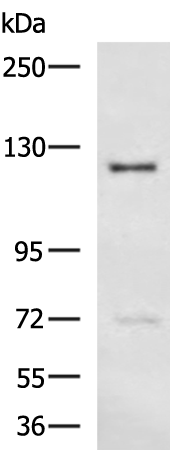
| WB | 咨询技术 | Human,Mouse,Rat |
| IF | 咨询技术 | Human,Mouse,Rat |
| IHC | 咨询技术 | Human,Mouse,Rat |
| ICC | 技术咨询 | Human,Mouse,Rat |
| FCM | 咨询技术 | Human,Mouse,Rat |
| Elisa | 1/5000-1/10000 | Human,Mouse,Rat |
| Aliases | KLA; HFTC3 |
| WB Predicted band size | 116 kDa |
| Host/Isotype | Rabbit IgG |
| Antibody Type | Primary antibody |
| Storage | Store at 4°C short term. Aliquot and store at -20°C long term. Avoid freeze/thaw cycles. |
| Species Reactivity | Human, Mouse, Rat |
| Immunogen | Synthetic peptide of human KL |
| Formulation | Purified antibody in PBS with 0.05% sodium azide and 50% glycerol. |
+ +
以下是3篇关于抗Ku抗体(anti-Ku antibody)的参考文献摘要,此抗体可能与系统性自身免疫疾病相关:
---
1. **文献名称**:*Anti-Ku antibody in systemic autoimmune diseases*
**作者**:Satoh M, et al.
**摘要**:该研究分析了抗Ku抗体在系统性红斑狼疮(SLE)、皮肌炎(DM)等疾病中的分布,发现其与肌肉炎症、间质性肺病及雷诺现象显著相关,提示其作为临床诊断标志物的潜力。
2. **文献名称**:*Clinical significance of anti-Ku antibodies in connective tissue diseases*
**作者**:Cozzani E, et al.
**摘要**:文章通过回顾性队列研究,指出抗Ku抗体阳性患者常表现为重叠综合征(如硬皮病-肌炎),并强调其与特定脏器损伤(如肺纤维化)的关联性。
3. **文献名称**:*Long-term outcomes in anti-Ku-positive patients: a single-center study*
**作者**:Béland C, et al.
**摘要**:该研究追踪抗Ku抗体阳性患者10年预后,发现其疾病进展较缓慢,但需警惕恶性肿瘤风险升高,提示需长期监测。
---
注:若“KL抗体”指其他靶标(如Klotho蛋白抗体),建议提供更多背景以调整参考文献。
**Background of Anti-Keratin Antibodies (AKA):**
Anti-keratin antibodies (AKA), first identified in the 1970s, are autoantibodies targeting cytokeratins, particularly acidic type I keratins (e.g., CK8. CK18) in epithelial tissues. They are primarily associated with rheumatoid arthritis (RA), where their presence correlates with disease severity and erosive joint damage. AKA detection, often via indirect immunofluorescence using rodent esophagus sections, reveals a characteristic "keratin pattern" staining.
While less sensitive than anti-cyclic citrullinated peptide (anti-CCP) antibodies, AKA exhibits high specificity (~95%) for RA, aiding early diagnosis and differential diagnosis from other rheumatic diseases. Their formation is linked to post-translational modifications (e.g., citrullination) of keratin in inflamed synovial tissue, triggering immune responses.
Studies suggest AKA may participate in RA pathogenesis by forming immune complexes that amplify inflammation. Despite being partially eclipsed by anti-CCP in clinical practice, AKA remains a valuable biomarker, especially in seronegative RA cases. Ongoing research explores their role in prognosis and disease monitoring, underscoring their enduring relevance in autoimmune diagnostics.
×